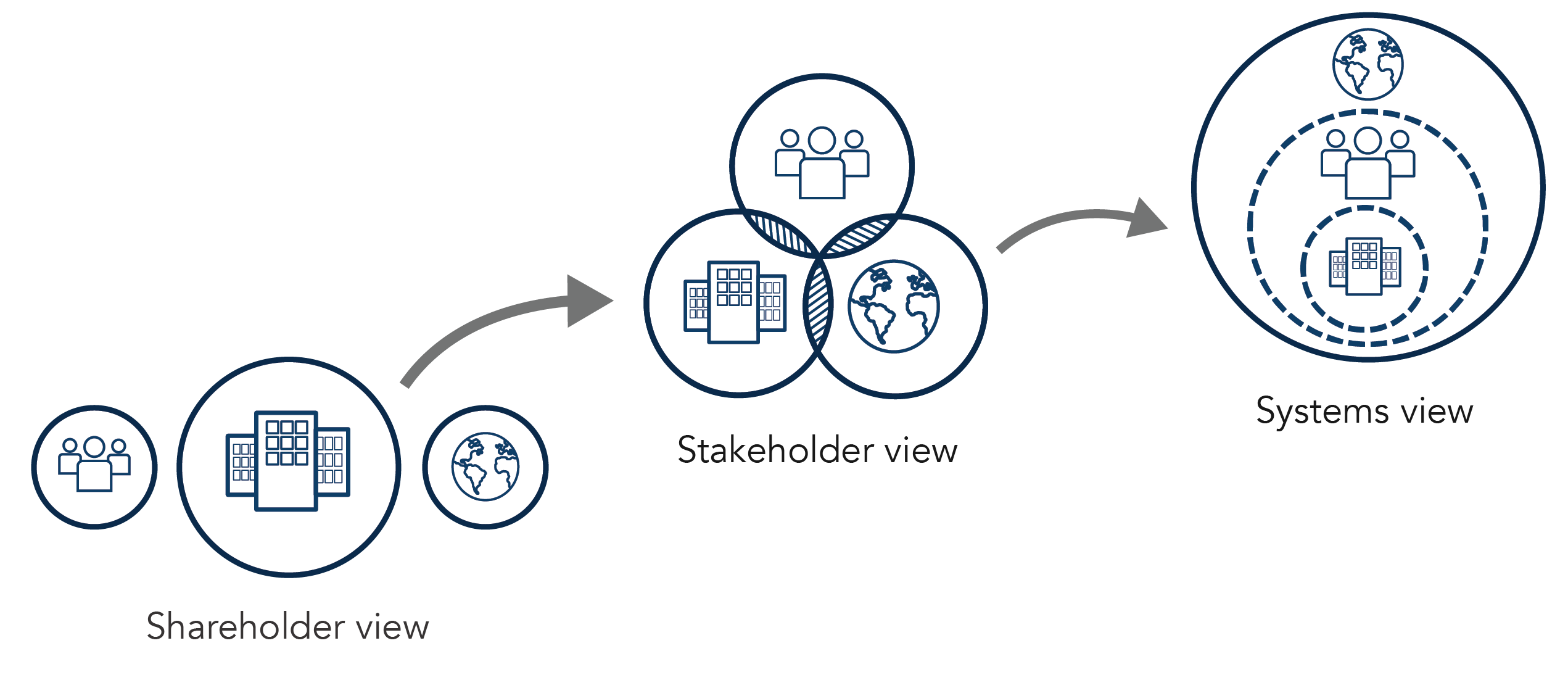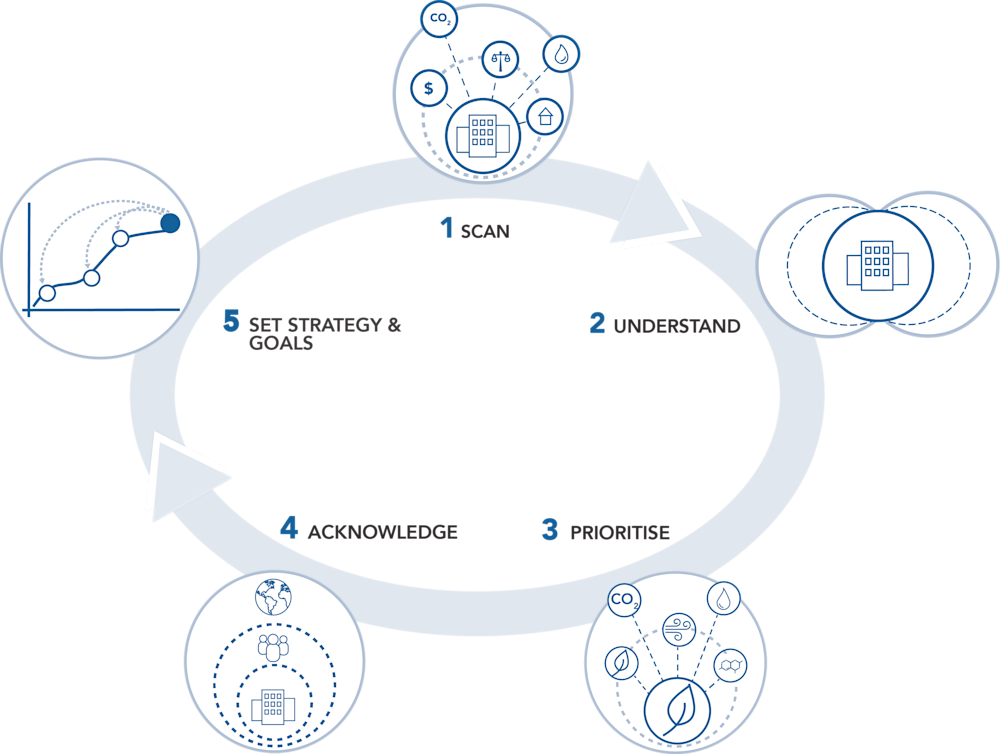
Image by shuttertim82 on Shutterstock
In this blog, we explain the concept of business sustainability, how it relates to other terms like ESG and regeneration, and why it makes business sense to take credible action on sustainability.
What is sustainability?
In its broadest sense, sustainability is the capacity of a system to maintain its current state indefinitely. In 1987, the United Nations Brundtland Commission defined sustainable development as “meeting the needs of the present without compromising the ability of future generations to meet their own needs.”
What is business sustainability?
Businesses use the word ‘sustainable’ in a variety of ways. Sometimes, the phrase simply means that the company can ‘sustain’ its current performance or current growth rate by maintaining a sustainable advantage or sustained growth.
In contrast, being a ‘sustainable business’ means that your company is focused on generating long-term economic returns while making responsible decisions today that minimise (or where possible, eliminate) the negative impacts it has on the environment and society; and where practical, making investments that also help to generate positive impacts.
Sustainable businesses take a long-term view and take the time to understand their direct impacts and the impacts of their value chains. Sustainable businesses work to protect the environment by decarbonising, protecting and restoring nature, preventing pollution, and working to eliminate waste. Sustainable businesses respect human rights, support the wellbeing of workers, provide decent work and fair compensation, and contribute to the resilience of the communities where they operate. Finally, sustainable businesses engage in ethical and responsible business practices and transparently disclose their performance.
Sustainability vs ESG – What’s the difference?
While the two terms overlap significantly, it is important to distinguish between them. Sustainability is a holistic concept, anchored in systems thinking, that is tied to the long-term health and resilience of the planet and society. Sustainability is the aspiration. It’s the end goal. Businesses engage in responsible/sustainable business practices that aim to minimise their adverse environmental, social, and governance-related impacts and help to create positive impacts for people and the planet.
While sustainability is the outcome we all need, ‘ESG’ is the shorthand often used to describe a company’s exposure to environmental, social, and corporate governance issues, to identify the impacts that they may have on the environment and society, and to describe a company’s performance in these areas.
What does it mean to be regenerative?
Another term that is gaining more use is regeneration. Regeneration shifts the focus from "doing less bad" to restoration, renewal, and positive impact. Companies that take a regenerative approach are simultaneously working to minimise or eliminate their negative impacts on the environment, workers, and society while also making investments towards restoring and revitalising ecosystems and communities, to create positive impacts.
Why should businesses take credible action on sustainability?
First, all businesses, whether in their direct operations or indirectly through their supply chains, depend on society and a healthy environment. Businesses cannot continue to erode the resilience of these systems without dire consequences. The climate and nature crises that we now face, as well as social instability stemming from inequality (and exacerbated by these environmental crises), are having an increasingly negative impact on businesses and disrupting supply chains. Recognising this needs to be a core part of your strategy process.
Almost 50 years ago, companies were told to look beyond their own corporate borders by factoring their industry environment into their strategy-making process1. Fast forward to the present and increasing resource scarcity, the climate and nature crises, growing regional inequality, and heightened social and political uncertainty are driving executives and boards to broaden their understanding of systemic issues and the constraints they place on their businesses. These days, companies need to actively consider two additional forces in their strategy-making: social resilience and environmental resilience.

Source: Embedding Project
This means going beyond a focus on shareholder value, and even stakeholder value, to consider systems value. Many companies still equate sustainability with ‘stakeholder capitalism’, using concepts like the ‘triple bottom line’ or ‘shared value’ to guide their thinking. But these ‘win-win’ approaches often end up with well-intentioned initiatives that don’t address the core issues in the business strategy that are driving these impacts.

Source: Embedding Project
Instead, companies need to understand that their business (and its value chain) form part of a nested system that is bounded by, and embedded within, the environmental, social, and economic systems in which they operate – and that it is in their interest (and a core part of their responsibility) to contribute to the resilience of those systems.
Employees, consumers, customers, communities, investors, and regulators are all expecting companies to act responsibly and do their part to support a healthy environment and contribute positively to society. The good news is that acting responsibly also brings business benefits:
Understanding and proactively mitigating your environmental and social impacts can help your organisation to identify and mitigate risks in your direct operations and in your value chain.
Improving your sustainability performance will help you to respond to increasing investor and regulatory demands for disclosure.
Employees are seeking out companies that share their values. Sustainable businesses benefit in terms of talent attraction, higher employee engagement, and talent retention.
Consumers increasingly want to buy from responsible companies, and many companies are now including sustainability criteria in their procurement processes. By demonstrating credible sustainability performance, your business can attract new customers and increase loyalty with existing ones.
Developing a credible strategy for sustainability
If you are early in your journey, this blog will help your business to get started on sustainability.
If you are ready to dive in, we suggest reading our embedded strategies guide where we provide more detail on the five key steps to develop a credible strategy for sustainability.

Source: Embedding Project
Footnotes
Image by shuttertim82 on Shutterstock.
1 Porter, Michael, E. Competitive Strategy: Techniques for Analyzing Industries and Competitors. New York: Free Press, 1980.